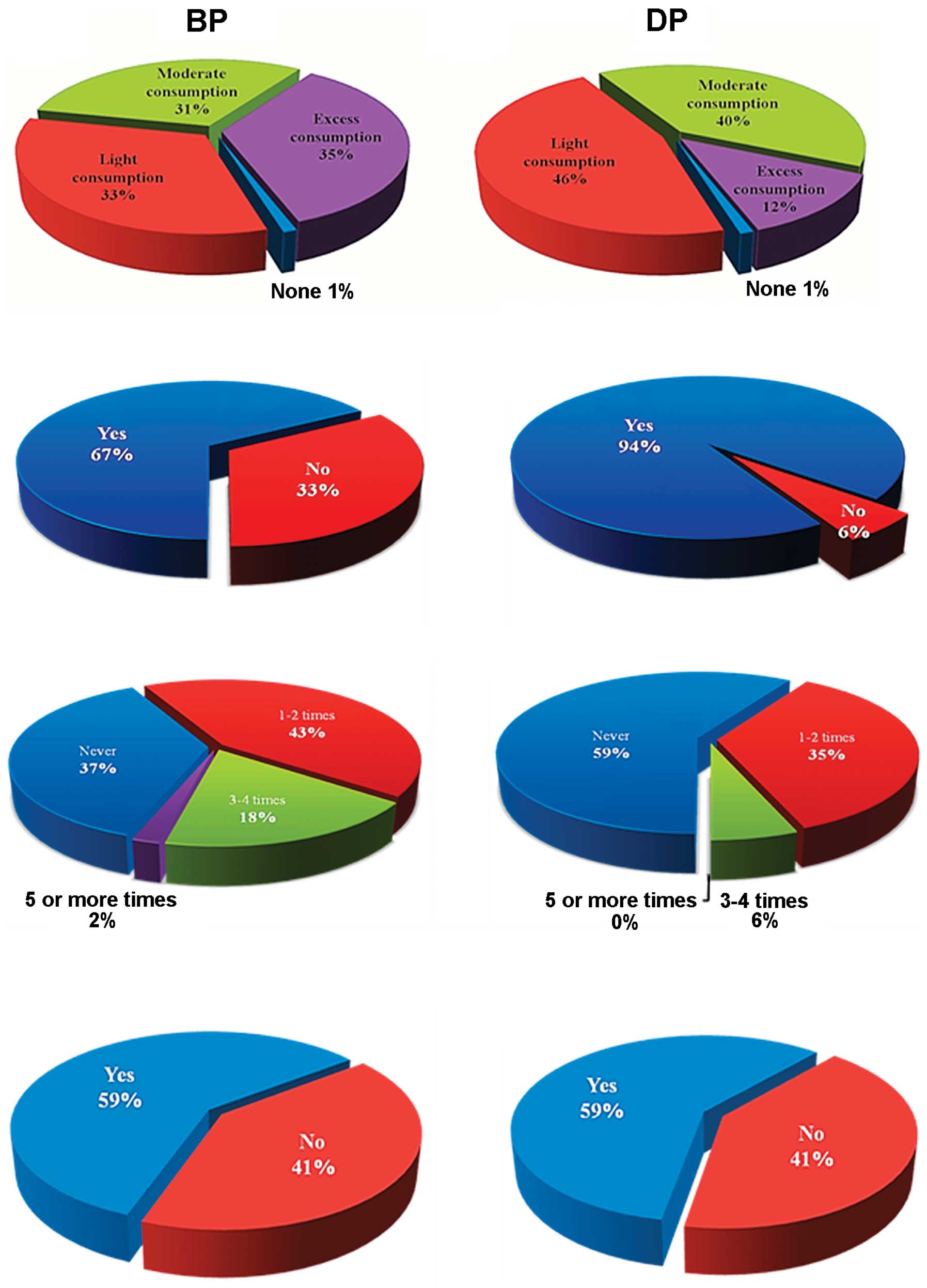|
1.
|
Shapira N: Prenatal nutrition: a critical
window of opportunity for mother and child. Womens Health (Lond
Engl). 4:639–656. 2008. View Article : Google Scholar : PubMed/NCBI
|
|
2.
|
Vujkovic M, Steegers EA, Looman CW, Ocké
MC, van der Spek PJ and Steegers-Theunissen RP: The maternal
Mediterranean dietary pattern is associated with a reduced risk of
spina bifida in the offspring. BJOG. 116:408–415. 2009. View Article : Google Scholar : PubMed/NCBI
|
|
3.
|
de Batlle J, Garcia-Aymerich J,
Barraza-Villarreal A, Antó JM and Romieu I: Mediterranean diet is
associated with reduced asthma and rhinitis in Mexican children.
Allergy. 63:1310–1316. 2008.PubMed/NCBI
|
|
4.
|
Mariscal-Arcas M, Rivas A, Monteagudo C,
Granada A, Cerrillo I and Olea-Serrano F: Proposal of a
Mediterranean diet index for pregnant women. Br J Nutr.
102:744–749. 2009. View Article : Google Scholar : PubMed/NCBI
|
|
5.
|
Marcus SM and Heringhausen JE: Depression
in childbearing women: when depression complicates pregnancy. Prim
Care. 36:151–165. 2009. View Article : Google Scholar : PubMed/NCBI
|
|
6.
|
Lobel M, Cannella DL, Graham JE, DeVincent
C, Schneider J and Meyer BA: Pregnancy-specific stress, prenatal
health behaviours, and birth outcomes. Health Psychol. 27:604–615.
2008. View
Article : Google Scholar : PubMed/NCBI
|
|
7.
|
Karaçam Z and Ançel G: Depression, anxiety
and influencing factors in pregnancy: a study in a Turkish
population. Midwifery. 25:344–356. 2009.PubMed/NCBI
|
|
8.
|
Paffenbarger RS Jr, Wing AL and Hyde RT:
Physical activity as an index of heart attack risk in college
alumni. Am J Epidemiol. 108:161–175. 1978.PubMed/NCBI
|
|
9.
|
Wang L, Wang X, Wang W, Chen C,
Ronnennberg AG, Guang W, Huang A, Fang Z, Zang T, Wang L and Xu X:
Stress and dysmenorrhoea: a population based prospective study.
Occup Environ Med. 61:1021–1026. 2004. View Article : Google Scholar : PubMed/NCBI
|
|
10.
|
Mendelsohn C: Women who smoke - a review
of the evidence. Aust Fam Physician. 40:403–407. 2010.
|
|
11.
|
Hackshaw A, Rodeck C and Boniface S:
Maternal smoking in pregnancy and birth defects: a systematic
review based on 173 687 malformed cases and 11.7 million controls.
Hum Reprod Update. 17:589–604. 2011. View Article : Google Scholar : PubMed/NCBI
|
|
12.
|
Jones LL, Hashim A, McKeever T, Cook DG,
Britton J and Leonardi-Bee J: Parental and household smoking and
the increased risk of bronchitis, bronchiolitis and other lower
respiratory infections in infancy: systematic review and
meta-analysis. Respir Res. 12:52011. View Article : Google Scholar : PubMed/NCBI
|
|
13.
|
Goldenberg RL, McClure EM, Saleem S and
Reddy UM: Infection-related stillbirths. Lancet. 375:1482–1490.
2010. View Article : Google Scholar : PubMed/NCBI
|
|
14.
|
Goldenberg RL, Hauth JC and Andrews WW:
Intrauterine infection and preterm delivery. N Engl J Med.
342:1500–1507. 2000. View Article : Google Scholar : PubMed/NCBI
|
|
15.
|
Conde-Agudelo A, Villar J and Lindheimer
M: Maternal infection and risk of preeclampsia: systematic review
and meta-analysis. Am J Obstet Gynecol. 198:7–22. 2008. View Article : Google Scholar : PubMed/NCBI
|
|
16.
|
Lain SJ, Roberts CL, Warning J,
Vivian-Taylor J and Ford JB: A survey of acute self-reported
infections in pregnancy. BMJ Open. 1:e0000832011.PubMed/NCBI
|
|
17.
|
Kuczkowski KM: Caffeine in pregnancy. Arch
Gynecol Obstet. 280:695–698. 2009. View Article : Google Scholar
|
|
18.
|
Wen W, Shu XO, Jacobs DR Jr and Brown JE:
The associations of maternal caffeine consumption and nausea with
spontaneous abortion. Epidemiology. 12:38–42. 2001. View Article : Google Scholar : PubMed/NCBI
|
|
19.
|
Adeney KL, Williams MA, Schiff MA, Qiu C
and Sorensen TK: Coffee consumption and the risk of gestational
diabetes mellitus. Acta Obstet Gynecol Scand. 86:161–166. 2007.
View Article : Google Scholar : PubMed/NCBI
|
|
20.
|
Crozier TW, Stalmach A, Lean ME and
Crozier A: Espresso coffees, caffeine and chlorogenic acid intake:
potential health implications. Food Funct. 3:30–33. 2012.
View Article : Google Scholar : PubMed/NCBI
|
|
21.
|
Nawrot P, Jordan S, Eastwood J, Rotstein
J, Hugenholtz A and Feeley M: Effects of caffeine on human health.
Food Addit Contam. 20:1–30. 2003. View Article : Google Scholar
|
|
22.
|
Block G: Foods contributing to energy
intake in the US: data from NHANES III and NHANES 1999–2000. J Food
Compost Anal. 17:439–447. 2004.
|
|
23.
|
Schulze MB, Liu S, Rimm EB, Manson JE,
Willett WC and Hu FB: Glycemic index, glycemic load, and dietary
fiber intake and incidence of type 2 diabetes in younger and
middle-aged women. Am J Clin Nutr. 80:348–356. 2004.PubMed/NCBI
|
|
24.
|
Halldorsson TI, Strøm M, Petersen SB and
Olsen SF: Intake of artificially sweetened soft drinks and risk of
preterm delivery: a prospective cohort study in 59,334 Danish
pregnant women. Am J Clin Nutr. 92:626–633. 2010. View Article : Google Scholar : PubMed/NCBI
|
|
25.
|
Wen LM, Flood VM, Simpson JM, Rissel C and
Baur LA: Dietary behaviours during pregnancy: findings from
first-time mothers in southwest Sydney, Australia. Int J Behav Nutr
Phys Act. 7:132010. View Article : Google Scholar : PubMed/NCBI
|
|
26.
|
Baldini M, Pasqui F, Bordoni A and
Maranesi M: Is the Mediterranean lifestyle still a reality?
Evaluation of food consumption and energy expenditure in Italian
and Spanish university students. Public Health Nutr. 12:148–155.
2009. View Article : Google Scholar : PubMed/NCBI
|
|
27.
|
Melzer K, Schutz Y, Boulvain M and Kayser
B: Physical activity and pregnancy: cardiovascular adaptations,
recommendations and pregnancy outcomes. Sports Med. 40:493–507.
2010. View Article : Google Scholar : PubMed/NCBI
|
|
28.
|
Coleman PK, Reardon DC and Cougle JR:
Substance use among pregnant women in the context of previous
reproductive loss and desire for current pregnancy. Br J Health
Psychol. 10:255–268. 2005. View Article : Google Scholar : PubMed/NCBI
|
|
29.
|
Robbins AS, Chao SY, Frost LZ and Fonseca
VP: Unplanned pregnancy among active duty service women, US Air
Force, 2001. Mil Med. 170:38–43. 2005.PubMed/NCBI
|
















